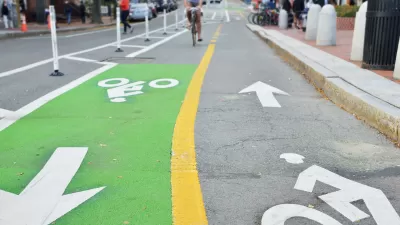In anti-growth Santa Barbara, preservationists and smart growth advocates have forged a compromise that will permit taller buildings for developments that include affordable housing.
"A group that has been passing around a petition to limit building heights in Santa Barbara stood shoulder-to-shoulder on the steps of City Hall with their nemesis, the "smart-growth" crowd who preach the gospel of building up-not out-to avoid sprawl. The occasion, on Thursday afternoon, April 24, was to announce that the two camps have laid the groundwork for a possible "treaty of El Pueblo Viejo." The fight over heights, sparked by recent developments on Chapala Street, drove a wedge between former allies in urban design battles of the past. However, it appeared to be over as both sides praised the compromise they have crafted during the past couple of months. The new coalition is hoping that the City Council will adopt their compromise as an ordinance."
"It would create a 40-foot height limit in all commercial zones that allow residential uses, with one major exception. Projects that include at least 30 percent affordable housing-up to 200 percent of the median income-would be rewarded with an additional 12 feet of height."
FULL STORY: Ceasefire in Downtown Height Fight

Planetizen Federal Action Tracker
A weekly monitor of how Trump’s orders and actions are impacting planners and planning in America.

Restaurant Patios Were a Pandemic Win — Why Were They so Hard to Keep?
Social distancing requirements and changes in travel patterns prompted cities to pilot new uses for street and sidewalk space. Then it got complicated.

Map: Where Senate Republicans Want to Sell Your Public Lands
For public land advocates, the Senate Republicans’ proposal to sell millions of acres of public land in the West is “the biggest fight of their careers.”

Maui's Vacation Rental Debate Turns Ugly
Verbal attacks, misinformation campaigns and fistfights plague a high-stakes debate to convert thousands of vacation rentals into long-term housing.

San Francisco Suspends Traffic Calming Amidst Record Deaths
Citing “a challenging fiscal landscape,” the city will cease the program on the heels of 42 traffic deaths, including 24 pedestrians.

California Homeless Arrests, Citations Spike After Ruling
An investigation reveals that anti-homeless actions increased up to 500% after Grants Pass v. Johnson — even in cities claiming no policy change.
Urban Design for Planners 1: Software Tools
This six-course series explores essential urban design concepts using open source software and equips planners with the tools they need to participate fully in the urban design process.
Planning for Universal Design
Learn the tools for implementing Universal Design in planning regulations.
Heyer Gruel & Associates PA
JM Goldson LLC
Custer County Colorado
City of Camden Redevelopment Agency
City of Astoria
Transportation Research & Education Center (TREC) at Portland State University
Camden Redevelopment Agency
City of Claremont
Municipality of Princeton (NJ)




























